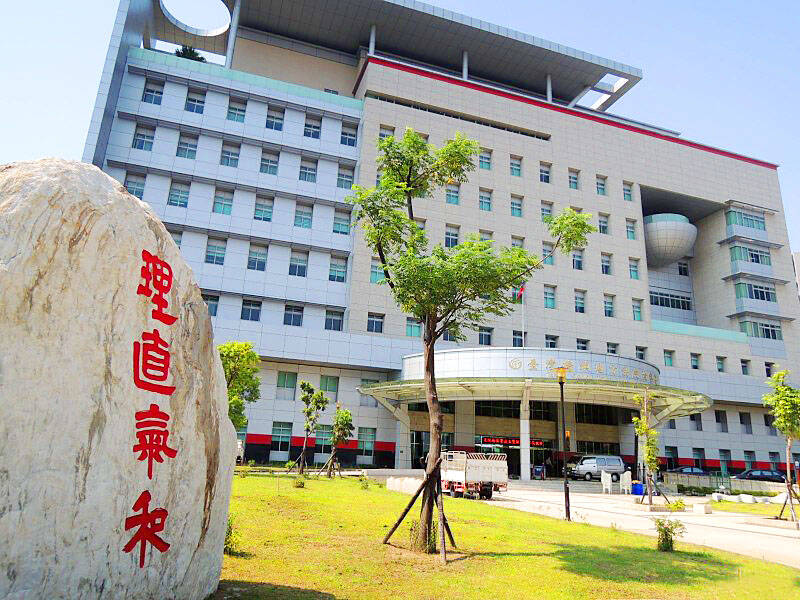Authorities have detained a man on suspicion of “fabricating” opinion polls with the intention of influencing the Jan. 13 presidential election, prosecutors said yesterday.
The Ciaotou District Prosecutors’ Office said it questioned four people on Friday for allegedly spreading fabricated presidential poll results through news media and social media.
Prosecutors said they detained former For Public Good Party deputy chairman Hsu Shao-tung (徐少東) on suspicion of contravening the Anti-infiltration Act (反滲透法) and the Presidential and Vice Presidential Election and Recall Act (總統副總統選舉罷免法) based on evidence from bank transactions.

Photo: Wu Cheng-feng, Taipei Times
Hsu’s son was released without needing to post bail. Hsu’s alleged co-conspirators, the head of the Kaohsiung Pastel Painting Association, surnamed Wang (王), and the director-general of the Railway Matsu Charity Association, surnamed Lee (李), paid bail of NT$200,000 and NT$100,000 respectively.
Their Chinese contact allegedly wired funds into accounts under Hsu’s and Wang’s names, prosecutors said, adding that Wang was the primary contact.
Investigators found that, under the Chinese agent’s orders, Hsu falsified research results and polls on presidential candidates and forwarded the false information to contacts on Line, they said.
Wang also took out advertisements in the Chinese-language Economic Daily News and the United Daily News, as well as on news Web sites, including Match Portal, Pchome News, Owl News and Life News, to help promote certain candidates, prosecutors said.
The candidates and parties that the fabricated opinion polls favored were not identified.
Prosecutors said that Hsu was also a chief consultant of a “new residents” association, a community organization for newcomers to Taiwan.
The association was accused by prosecutors earlier this month of arranging free trips to China for dozens of people in a bid to “influence” the elections.
“They aimed to use Taiwan’s large new resident population to develop organizations that could be controlled by these hostile foreign powers ... to influence the election, thereby endangering national security,” prosecutors said.
Hsu’s detention was the second case this week involving someone being held incommunicado on suspicion of faking presidential election polls.
On Friday, a court ordered that a reporter be detained in Taichung on suspicion of publishing online eight fake public opinion polls on the presidential election at the instruction of Chinese officials.
The Taichung District Prosecutors’ Office said that reporter Lin Hsien-yuan (林獻元), who works for Finger Media, in October asked a self-proclaimed polling expert, Su Yuan-hwa (蘇雲華), to produce a series of false poll results at the behest of the Chinese Communist Party’s Fujian Provincial Committee showing that the Chinese Nationalist Party’s (KMT) presidential ticket was favored by Taiwanese.
The results, which were shared on other online media platforms, misled the public and were part of China’s attempt to interfere in Taiwan’s presidential election, prosecutors said.
Additional reporting by CNA

The US government has signed defense cooperation agreements with Japan and the Philippines to boost the deterrence capabilities of countries in the first island chain, a report by the National Security Bureau (NSB) showed. The main countries on the first island chain include the two nations and Taiwan. The bureau is to present the report at a meeting of the legislature’s Foreign Affairs and National Defense Committee tomorrow. The US military has deployed Typhon missile systems to Japan’s Yamaguchi Prefecture and Zambales province in the Philippines during their joint military exercises. It has also installed NMESIS anti-ship systems in Japan’s Okinawa

‘WIN-WIN’: The Philippines, and central and eastern European countries are important potential drone cooperation partners, Minister of Foreign Affairs Lin Chia-lung said Minister of Foreign Affairs Lin Chia-lung (林佳龍) in an interview published yesterday confirmed that there are joint ventures between Taiwan and Poland in the drone industry. Lin made the remark in an exclusive interview with the Chinese-language Liberty Times (the Taipei Times’ sister paper). The government-backed Taiwan Excellence Drone International Business Opportunities Alliance and the Polish Chamber of Unmanned Systems on Wednesday last week signed a memorandum of understanding in Poland to develop a “non-China” supply chain for drones and work together on key technologies. Asked if Taiwan prioritized Poland among central and eastern European countries in drone collaboration, Lin

NO CONFIDENCE MOTION? The premier said that being toppled by the legislature for defending the Constitution would be a democratic badge of honor for him Premier Cho Jung-tai (卓榮泰) yesterday announced that the Cabinet would not countersign the amendments to the local revenue-sharing law passed by the Legislative Yuan last month. Cho said the decision not to countersign the amendments to the Act Governing the Allocation of Government Revenues and Expenditures (財政收支劃分法) was made in accordance with the Constitution. “The decision aims to safeguard our Constitution,” he said. The Constitution stipulates the president shall, in accordance with law, promulgate laws and issue mandates with the countersignature of the head of the Executive Yuan, or with the countersignatures of both the head of the Executive Yuan and ministers or

CABINET APPROVAL: People seeking assisted reproduction must be assessed to determine whether they would be adequate parents, the planned changes say Proposed amendments to the Assisted Reproduction Act (人工生殖法) advanced yesterday by the Executive Yuan would grant married lesbian couples and single women access to legal assisted reproductive services. The proposed revisions are “based on the fundamental principle of respecting women’s reproductive autonomy,” Cabinet spokesperson Michelle Lee (李慧芝) quoted Vice Premier Cheng Li-chiun (鄭麗君), who presided over a Cabinet meeting earlier yesterday, as saying at the briefing. The draft amendment would be submitted to the legislature for review. The Ministry of Health and Welfare, which proposed the amendments, said that experts on children’s rights, gender equality, law and medicine attended cross-disciplinary meetings, adding that